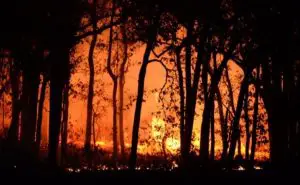If you live in an area prone to wildfires, it is important to have a standby generator. A standby generator can provide your home with the power it needs. But can a standby generator work if a fire gets too close? Find out below.
Can a standby generator work when a fire is nearby?
If you have a standby generator, it will keep working as long as there is fuel. If the fire does not get too close and threatens to consume the generator, it should continue working. However, if you feel your safety is threatened by a fire closing in on your property, then evacuate immediately.
If a fire does get too close to a generator, the intense heat or flames could cause the generator to malfunction, or even lead to the fuel tank exploding.
Will a generator work in a blackout?
As soon as they detect a blackout, automated backup generators such as whole-house systems and standby models kick on. Properly sized, they can provide power to the vast majority of your home’s electronic devices in the event of a power loss.
Can a standby generator be too big?
A generator that is too small to withstand the load might shut down or even cause harm to the device if it is undersized. An event called ‘wet stacking’, or carbon accumulation in the engine, can ultimately cause a power loss in a generator that is too big for the load.
What power source is used in emergency generators?
Diesel engines typically power these generators, however, gasoline engines may be used in smaller structures. Gas turbines may be seen in certain major buildings.
Related Questions and Answers
What are the advantages of a standby power supply?
Even if less effort was made in the past to limit power consumption, standby power is frequently required for a reason. In certain cases, it may allow a device to start up rapidly and without any delays that may otherwise be present.
What happens if you undersize a generator?
Installing an inadequate or underpowered generator would result in its inability to power the home’s electrical devices. To put it another way, if the generator is too tiny and under-rated, the voltage drop will slow down the current delivery to the appliances.
What happens if a generator is Underloaded?
Unchecked minor wear and tear on a diesel generator may soon mount if underloading is not addressed. It is more difficult for a diesel generator to heat up when it is underutilized. In addition to straining your glowplug, this will also damage your diesel engine.
Should I oversize my generator?
An accurate load assessment is critical when it comes to determining the proper size and location of a home backup generator. If it’s big, a generator that’s the wrong size is a waste of money, and if it’s small, it might harm your home’s appliances and the generator itself.
What are standby generators suitable for?
Standby generators are suitable for providing backup power when your home needs it. Find out more in this video:
What are the two methods of starting an emergency generator?
An emergency generator should be able to be started using two different methods, as is the standard. Both battery and hydraulic or pneumatic start should be options.
Is back feeding a generator illegal?
It might be, depending on local regulations. Instead of utilizing a transfer switch, you may connect a portable generator directly to your home’s main electrical panel via back feeding. However, this is a bad idea and often unlawful. It’s also something that should never be tried because it can cause damage to your electrical system.
Can a generator start a fire?
There is a risk of fires if portable generators are not utilized correctly or the fuel supply is not kept in a safe location. Portable generator fuel should be kept in clearly marked containers since it is combustible.
Do you plug into a generator before or after you start it?
Remove all electrical cables from the generator before starting it. Before connecting your generator to your house, you should fire it up. During startup, no-load should be applied.
Conclusion
Standby generators are typically powered by natural gas or diesel fuel, but can also be powered by other sources such as propane and solar power. These sources of energy are at risk of causing a severe accident if contacted by a fire that encroaches on the generator. So, if a fire breaks out nearby, it is best to simply evacuate from the area.
Standby and emergency generators must be tested and maintained within regular time frames after installation to be considered acceptable according to NFPA 110.
Related Tags
- backup generator regulations
- nfpa 110 generator requirements
- building code for generators
- diesel generator fire protection nfpa
- nfpa generator clearance
NEXT UP: Standby Generator Maintenance: Checklist & Schedule

